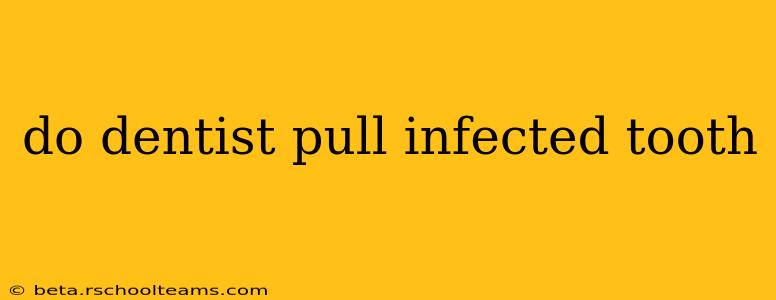Do Dentists Pull Infected Teeth? A Comprehensive Guide
Yes, dentists frequently extract infected teeth. An infected tooth, also known as an abscessed tooth, is a serious condition requiring prompt dental intervention. Ignoring an infected tooth can lead to severe complications, so extraction is often the most effective treatment option. However, the decision to extract an infected tooth isn't always straightforward. Let's explore this further.
When is Tooth Extraction Necessary for an Infection?
Several factors determine whether a dentist will recommend extraction for an infected tooth. These include:
-
Severity of the Infection: A mild infection might be treatable with root canal therapy, antibiotics, or other less invasive procedures. However, severe infections with extensive damage to the tooth's structure or surrounding bone often necessitate extraction. The dentist will assess the extent of the infection using X-rays and a clinical examination.
-
Extent of Bone Damage: Infections can cause significant damage to the bone surrounding the tooth. If the bone loss is extensive, it might be impossible to save the tooth, even with root canal treatment. In such cases, extraction is usually the best course of action.
-
Overall Oral Health: A patient's overall oral health plays a role. Patients with compromised immune systems or other health conditions might be more susceptible to complications from an infection. In these cases, prompt extraction might be prioritized to prevent the spread of the infection.
-
Patient Preferences: While the dentist will make recommendations based on the clinical findings, the patient's preferences are also considered. After a thorough explanation of the treatment options and their risks and benefits, the patient can participate in making informed decisions about their care.
What are the Alternatives to Extraction for an Infected Tooth?
While extraction is common for severely infected teeth, alternatives exist, particularly in less severe cases:
-
Root Canal Therapy: This procedure involves removing the infected pulp (the soft tissue inside the tooth) and cleaning and sealing the canals to prevent further infection. It's a common treatment for infected teeth, but its success depends on the severity and extent of the infection.
-
Antibiotics: Antibiotics help combat bacterial infections. Dentists often prescribe antibiotics alongside other treatments to control the infection and reduce inflammation. However, antibiotics alone rarely cure a severely infected tooth.
-
Drainage: In some cases, the dentist may make a small incision to drain the pus from the abscess. This procedure can provide temporary relief from pain and swelling, but it's usually not a long-term solution and often complements other treatments.
What Happens After an Infected Tooth is Extracted?
After tooth extraction, the dentist will provide post-operative instructions to ensure proper healing. These typically include:
-
Pain Management: Pain medication is usually prescribed to control discomfort.
-
Wound Care: Keeping the extraction site clean is crucial to prevent complications. The dentist will provide guidance on rinsing and avoiding certain foods.
-
Follow-up Appointments: Regular follow-up appointments are essential to monitor the healing process and address any issues that might arise.
How Can I Prevent Infected Teeth?
Practicing excellent oral hygiene is the best way to prevent infected teeth. This includes:
-
Brushing: Brush your teeth twice a day with fluoride toothpaste.
-
Flossing: Floss daily to remove plaque and food particles from between your teeth.
-
Regular Dental Checkups: Visit your dentist regularly for checkups and cleanings. Early detection of cavities and gum disease can prevent infections.
-
Healthy Diet: A balanced diet can contribute to overall oral health.
In summary, while dentists do extract infected teeth, it's not always the first or only option. The decision depends on several factors, and your dentist will work with you to determine the best course of action for your specific situation. Remember, prompt dental care is crucial for managing infected teeth and preventing serious complications.
